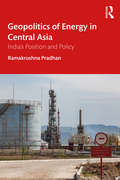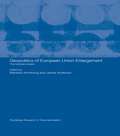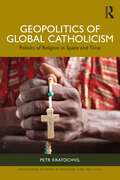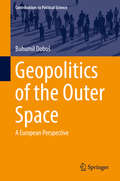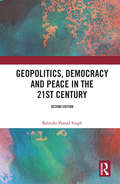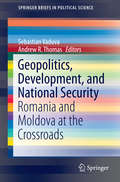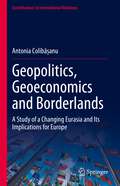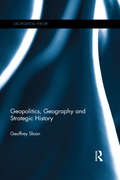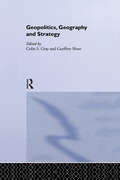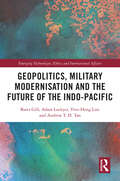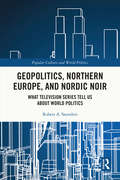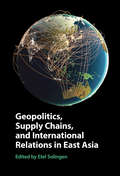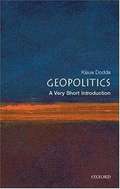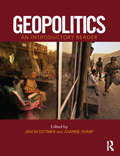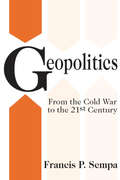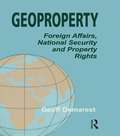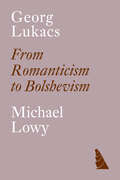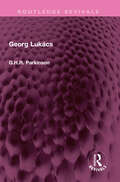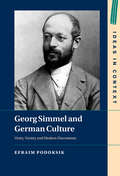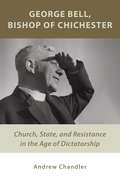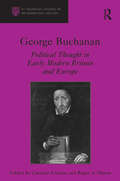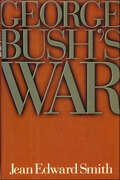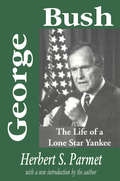- Table View
- List View
Geopolitics of Energy in Central Asia: India's Position and Policy
by Ramakrushna PradhanThis book focuses on the geopolitics of Central Asia which has emerged as the new fertile ground for oil and energy resources. It analyses the scramble for energy and control over the region by many nations and their diplomatic manoeuvrings to ensure energy sufficiency and economic growth. The book provides a quantitative analysis of the Central Asian energy potential and offers an understanding of the unique position that each country occupies in the geopolitics of oil and energy in the region. It looks at aggressive foreign policies by countries like the US, China, the European Union, Japan, Israel, Iran and Pakistan, focusing primarily on India’s position and strategies in the region within the new great game. The book further examines the dynamics between Central Asia and India and India’s policies for geopolitical engagement and diversification of energy sources. This volume will be of interest to researchers and students of political studies, international relations, economics, sociology, and Asian studies. It will also be useful for policymakers and professionals working in the field of energy security and geo-economics.
Geopolitics of European Union Enlargement: The Fortress Empire (Routledge Research in Transnationalism)
by James Anderson Warwick ArmstrongUnder the impact of accelerated globalization, transnational integration and international security concerns, the geopolitics of Europe's borders and border regions has become an area of critical interest. The progressive enlargement of the EU has positioned its borders at the heart of recent discussions on the changing nature of the EU, the meaning of 'Europe' and what constitutional shape a more politically unified Europe might take.With enlargement, the EU must elaborate strategies to contend with a fiercely competitive world - and to build fortress-like defences against perceived tensions arising from greater cultural mixing and threats such as terrorism. The authors build up an integral picture of the EU's internal and external borders and borderlands to reveal the processes of re-bordering and social change currently taking place in Europe. They explore issues such as security, immigration, economic development and changing social and political attitudes, as well as the EU's relations with the Islamic world and other world powers. The book embraces an array of disciplinary, ideological and theoretical perspectives, offering detailed case studies of different border regions and the concerns of the local inhabitants, while engaging in broader discussions of developments across Europe, state policies and the EU's relations with neighbouring states.Geopolitics of European Union Enlargement will be of key interest to students and researchers in the fields of European politics, geography, international studies, sociology and anthropology.
Geopolitics of Global Catholicism: Politics of Religion in Space and Time (Routledge Studies in Religion and Politics)
by Petr KratochvílGeopolitics of Global Catholicism uncovers the key trends in today’s Catholicism, providing an incisive analysis of its deep entanglement with national, regional, as well as global politics.This book offers an exciting exploration of five versions of local Catholicism(s) and sheds light on the various theo-political constellations that not only differ widely across these national contexts but also have global geopolitical consequences. It is built around a novel theoretical argument showing that Catholic geopolitics contains not only a spatial dimension (as classic geopolitical studies would have it) but also a temporal one. As a consequence, the Catholic role in the world cannot be simply understood as a result of the spatial expansion of the Church but rather as a result of the complex relationships between Catholicism and colonization, inculturation, backwardness, and modernization(s). To counter the lingering Eurocentrism of most studies of the Catholic Church, this book’s case studies explore Catholic geopolitics in five non-European contexts, focusing mainly on the Global South (plus the United States): Latin America (Brazil), North America (the United States), Asia (India and China), and Africa (the Democratic Republic of the Congo). These case studies also show that the successes and failures of Catholicism cannot be explained by a recourse to a single, top-down interpretation of Catholic geopolitics, but rather by exploring the various Catholic spatio-temporal constellations on the global, regional, and local levels. With the accelerating diversification of the Church and the growing role of the Global South, these local and regional influences gain further importance as they are likely to increasingly define the future of Catholicism.This book will be of utmost interest to scholars of International Relations, Religious Studies, Political Science, and Theology, as well as Geopolitics, especially to those studying the global rise of religion. Its accessible language will also appeal to the wider public beyond academia, especially those interested in global Christianity, as well as church leaders, and members of Catholic organizations.
Geopolitics of the Outer Space: A European Perspective (Contributions to Political Science)
by Bohumil DobošThis book presents a comprehensive geopolitical analysis of European space activities. By studying outer space as a physical and socio-economic space as well as a military-diplomatic area, the author helps readers understand outer space as a geopolitical environment. The book also offers insights into the behavior and strategies of different actors, with a special focus on the European space strategy and the nature of the European space program and diplomacy.
Geopolitics, Democracy and Peace in the 21st Century
by Balmiki Prasad SinghThis book examines a wide range of issues that are expected to play a dominant role in shaping the 21st century. Delineating key concerns in geopolitics, democracy and peace, it studies the functions and influences of educational institutions, progressive religious and social groups, communities, international institutions such as the United Nations (UN); and forums promoting inter-faith dialogue. The author underscores how the century may be forged by a pluralist ethos: multiple and diverse nation states, centres of power, faiths, cultures, economies, and languages. He stresses the need to nurture moral strength and enlightened leadership for a life of compassion, peace and holistic development. In his second edition, the author further examines what the future holds for democracy. The volume takes stock of the recent developments in world politics, and highlights the urgent need for the Bahudha approach — inculcating a culture of dialogue and debate for peaceful resolution of conflicts. Lucid and engaging, this book will interest scholars and researchers of political studies, international relations, public policy, governance and development studies.
Geopolitics, Development, and National Security
by Andrew R. Thomas Sebastian VaduvaThis volume focuses on the spotlight on Romania and Moldova, two distinct nations that share a common language, history and culture. Romania is a NATO member since 2004 and a fully integrated nation into the European Union since 2007, while The Republic of Moldova (a former Soviet republic) is attempting to join both international organizations for security and development reasons. Ever since the Iron Curtain fell on Europe at the end of World War II, the term "Eastern Europe" has been used without much regard for the diversity of the region. Given the geographical proximity, perhaps this is an understandable error. However, moving forward into the twenty-first century, and considering the highly sensitive geopolitical, security and development issues playing out in the region, we believe each nation should be treated with the unique distinction it deserves. Building a mosaic of the most current research, practical application, and policy, the authors, who represent unique, insider perspectives, cover a range of emerging and timely topics from Black Sea security to cultural analyses, organizational development and risk assessment shedding light on social, political and economic challenges of rapid transition in the region, while considering the implications for research, practice and policy in other front-line regions around the world.
Geopolitics, Geoeconomics and Borderlands: A Study of a Changing Eurasia and Its Implications for Europe (Contributions to International Relations)
by Antonia ColibășanuThis book discusses the emerging threats to European stability in different borderland regions, from the Greater Middle East to the Eastern Mediterranean, the Balkans and the Black Sea. It highlights the specific geopolitical risks that could, left unchecked, have global repercussions. The book shows how recent events have exasperated underlying problems that have been slowly destabilizing each of these regions for years. It also looks at the geopolitical constraints and objectives of the countries within these regions to build a basis for understanding their current and future security challenges. While doing so, the book discusses the European borderlands in a non-traditional way, proposing a specific framework to study them, going beyond historical analysis and employing a heuristic process and in-depth socio-economic analysis to understand regional power relations and trends. It develops the key concepts of "core borderland" and "geopolitical node" to understand the future challenges that Europe in particular and Eurasia, in general, will face, discussing specific features shaping current affairs and identifying the main drivers - countries and specific regional elements - for the future stability of the borderlands. This book will appeal to students and scholars of international relations, as well as policy-makers, practitioners, and international organizations interested in a better understanding of current and future challenges at Europe's borderlands and the security risks the European continent faces.
Geopolitics, Geography and Strategic History (Geopolitical Theory)
by Geoffrey SloanThis volume examines geopolitics by looking at the interaction between geography, strategy and history. This book addresses three interrelated questions: why does the geographical scope of political objectives and subsequent strategy of states change? How do these changes occur? Over what period of time do these changes occur? The theories of Sir Halford Mackinder and Nicholas Spykman are examined in order to provide an analytical narrative for five case studies, four historical and one contemporary. Taken together they offer the prospect of converting descriptions of historical change into analytic explanations, thereby highlighting the importance of a number of commonly overlooked variables. In addition, the case studies will illuminate the challenges that states face when attempting to change the scope of their foreign policy and geo-strategy in response to shifts in the geopolitical reality. This book breaks new ground in seeking to provide a way to understand why and how the geographical scope of political objectives and subsequent strategy both expands and contracts. This book will be of much interest to students of geopolitics, strategic studies, military history, and international relations.
Geopolitics, Geography and Strategy
by Colin S. Gray Geoffrey SloanGeopolitical conditions influence all strategic behaviour - even when cooperation among different kinds of military power is expected as the norm, action has to be planned and executed in specific physical environments. The geographical world cannot be avoided, and it happens to be 'organized' into land, sea, air and space - and possibly the electromagnetic spectrum including 'cyberspace'. Although the meaning of geography for strategy is a perpetual historical theme, explicit theory on the subject is only one hundred years old. Ideas about the implication of geographical, especially spatial, relationships for political power - which is to say 'geopolitics'- flourished early in the twentieth century.Divided into theory and practice sections, this volume covers the big names such as Mackinder, Mahan and Haushofer, as well as looking back at the vital influence of weather and geography on naval power in the long age of sail (sixteenth to nineteenth centuries). It also looks forward to the consequences of the revival of geopolitics in post-Soviet Russia and the new space-based field of "astropolitics".
Geopolitics, Military Modernisation and the Future of the Indo-Pacific (Emerging Technologies, Ethics and International Affairs)
by Bates Gill Andrew T. Tan Adam Lockyer Yves-Heng LimThis book examines to what extent geopolitics explains the current wave of force modernisation in the Indo-Pacific region. Examining the leading Indo-Pacific nations in terms of defence spending: the United States, China, India, Japan, South Korea, Australia, Taiwan, Singapore, Pakistan, Indonesia and Thailand, geopolitical principles are used to create hypotheses that can be tested against the military modernisation programmes of the major actors in the Indo-Pacific region. The book represents a bridge between reference works and the literature on international politics in the Indo-Pacific. The empirical chapters provide qualitative narratives that explore the force postures, military modernisation and procurement patterns of the cases, and assess why these nations’ military modernisation has followed particular courses and evaluate this evidence against the expectations of geopolitics and its rivals. This book will be a valuable addition to scholars, practitioners and, indeed, anyone interested in the future stability of one of the world’s most important and dynamic regions.
Geopolitics, Northern Europe, and Nordic Noir: What Television Series Tell Us About World Politics (Popular Culture and World Politics)
by Robert A. SaundersWith its focus on the popular television genre of Nordic noir, this book examines subtle and explicit manifestations of geopolitics in crime series from Scandinavia and Finland, as well as the impact of such programmes on how northern Europe is viewed around the world. Drawing on a diverse set of literature, from screen studies to critical International Relations, Geopolitics, Northern Europe, and Nordic Noir addresses the fraught geopolitical content of Nordic television series, as well as how Nordic noir as a genre travels the globe. With empirical chapters focusing on the interlinked concepts of the body, the border, and the nation-state, this book interrogates the various ways in which northern European states grapple with challenges wrought by globalisation, neoliberalism, and climate change. Reflecting the current global fascination with all things Nordic, this text examines the light and dark sides of the region as seen through the television screen, demonstrating that series such as Occupied, Trapped, and The Bridge have much to teach us about world politics. This book will be of interest to those interested in geopolitics, national identity, and the politics of popular culture in: Scandinavian studies, media/screen studies, IR/political science, human/cultural geography, sociology, anthropology, cultural studies, and communication.
Geopolitics, Supply Chains, and International Relations in East Asia
by Etel SolingenGlobal supply chains connect the world in unprecedented and intricate ways. Geopolitics, Supply Chains, and International Relations in East Asia dissects the sources and effects of contemporary disruptions of these networks. Despite their dramatic expansion as distinct, complex, and unique mechanisms of economic interdependence, the role of supply chains in broader patterns of interstate conflict and cooperation has been relatively neglected. This volume sheds light on whether a highly interdependent “Factory Asia” and Asia-Pacific can withstand geopolitical, geo-economic, and pandemic threats. This combustible mix, fueled by rising hyper-nationalism in the US and China, threatens to unleash sizable disruptions in the global geography of production and in the international relations of East Asia.
Geopolitics: A Very Short Introduction
by Klaus DoddsGeopolitics is a way of looking at the world: one that considers the links between political power, geography, and cultural diversity. In certain places such as Iraq or Lebanon, moving a few feet either side of a territorial boundary can be a matter of life or death, dramatically highlighting the connections between place and politics. Even far away from these 'danger zones' - in Europe or the US for example - geopolitics remains an important part of everyday life. For a country's location and size as well as its sovereignty and resources all affect how the people that live there understand and interact with the wider world. Using wide-ranging examples, from historical maps to James Bond films and the rhetoric of political leaders like Churchill and George W. Bush, this Very Short Introduction shows why, for a full understanding of contemporary global politics, it is not just smart - it is essential - to be geopolitical.
Geopolitics: An Introductory Reader (Critical Geopolitics)
by Jason Dittmer Jo SharpIt has been increasingly impossible to think about our changing world without coming across the term 'geopolitics'. In the wake of the invasion and occupation of Iraq by the United States, United Kingdom, and others, geopolitics has been offered as an explanation for the occupation's failure to reinvent the Iraqi state and as a blueprint for future action. But what is 'geopolitics'? Drawing both on academic and political material, this book introduces readers to the concept of geopolitics, from the first usage of the term to its more recent reconceptualisations. The concept of geopolitics is introduced through four thematic sections - Imperial Geopolitics, Cold War Geopolitics, Geopolitics after the Cold War and Reconceptualising Geopolitics. Each section includes key writings from a range of diverse and leading authors such as Said, Agnew, Dalby, O Tuathail, Gregory, Barnett and Kaplan, and is accompanied by a critical introduction by the editors to guide the reader through the material. This Reader establishes the foundations of geopolitics while also introducing readers to the continuing significance of the concept in the 21st century. This Reader provides an essential resource that exposes students to original writing. The Editors provide a pathway through the material with Section Introductions to assist the readers understanding of the context of the material and impacts of the writings. The readings included draw from a range of authors, writing from a range of locations. The Reader concludes with the latest changes in geopolitical thought, incorporating feminist and other perspectives.
Geopolitics: From the Cold War to the 21st Century
by Francis SempaWriters, observers, and practitioners of international politics frequently invoke the term "geopolitics" to describe, explain, or analyze specific foreign policy issues and problems. Such generalized usage ignores the fact that geopolitics as a method of understanding international relations has a history that includes a common vocabulary, well-established if sometimes conflicting concepts, an extensive body of thought, and a recognized group of theorists and scholars. In Geopolitics, Francis P. Sempa presents a history of geopolitical thought and applies its classical analyses to Cold War and post-Cold War international relations.While mindful of the impact of such concepts as "globalization" and the "information revolution" on our understanding of contemporary events, Sempa emphasizes traditional geopolitical theories in explaining the outcome of the Cold War. He shows that, the struggle between the Western allies and the Soviet empire was unique in its ideological component and nuclear standoff, the Cold War fits into a recurring geopolitical pattern. It can be seen as a consequence of competition between land powers and sea powers, and between a potential Eurasian hegemonic power and a coalition of states opposed to that would-be hegemony.The collapse of the Soviet empire ended the most recent threat to global stability. Acting as a successor to the British Empire, the United States organized, funded, and led a grand coalition that successfully countered the Soviet quest for domination. No power or alliance posed an immediate threat to the global balance of power. Indeed, the end of the Cold War generated hopes for a "new world order" and predictions that economics would replace geopolitics as the driving force in international politics. Russian instability, the nuclear dimension of the India-Pakistan conflict, and Chinese bids for dominance have turned the Asia-Pacific region into what Mahan called "debatable and debated ground." Russi
Geoproperty: Foreign Affairs, National Security and Property Rights
by Geoff DemarestSome innovations create new strategic property and new conflicts. Demarest argues that we have not reached the end of history and modern man will continue to fight over property as before, but the property will be of a post-modern character, such as electronic wavelengths and genetic codes.
Georg Lukacs: From Romanticism to Bolshevism
by Michael LöwyOn the 100th anniversary of the publication of History and Class Consciousness, a new edition of this indispensable guide to Lukacs's thought and politicsThe philosophical and political development that converted Georg Lukács from a distinguished representative of Central European aesthetic vitalism into a major Marxist theorist and Communist militant has long remained an enigma.In this this now classic study, Michael Löwy for the first time traced and explained the extraordinary mutation that occurred in Lukács's thought between 1909 and 1929. Utilizing many as yet unpublished sources, Löwy meticulously reconstructed the complex itinerary of Lukács's thinking as he gradually moved towards his decisive encounter with Bolshevism.The religious convictions of the early Lukács, the peculiar spell exercised on him and on Max Weber by Dostoyevskyan images of pre-revolutionary Russia, the nature of his friendships with Ernst Bloch and Thomas Mann, were amongst the discoveries of the book.Then, in a fascinating case-study in the sociology of ideas, Löwy showed how the same philosophical problematic of Lebensphilosophie dominated the intelligentsias of both Germany and Hungary in the pre-war period, yet how the different configurations of social forces in each country bent its political destiny into opposite directions. The famous works produced by Lukács during and after the Hungarian Commune—Tactics and Ethics, History and Class Consciousness and Lenin—were analysed and assessed. A concluding chapter discussed Lukács's eventual ambiguous settlement with Stalinism in the thirties, and its coda of renewed radicalism in the final years of his life.In this new edition, Löwy has added a substantial new introduction which reassess the nature of Lukacs's thought in the light of newly published texts and debates.
Georg Lukács (Routledge Revivals)
by G.H.R. ParkinsonFirst published in 1977, Georg Lukács gives an outline of Lukács’ views and explains how they are related to the relevant cultural traditions of his epoch. The author covers the whole range of Lukács’ thought, from his earliest literary criticism to the posthumous Ontology of Social Existence. Lukács’ early writings in particular are frequently obscure in style and impregnated with the language and thought of Hegel. Professor Parkinson has elucidated Lukács’ principal writings in systematic fashion, and the book includes a detailed exposition of Lukács’ influential but difficult book History and Class Consciousness. This should be an indispensable book for all those who seek a clear, comprehensible introduction to the writings of one of the most influential Marxist thinkers of our time.
Georg Simmel and German Culture: Unity, Variety and Modern Discontents (Ideas in Context #135)
by Efraim PodoksikThe significance of the German philosopher and social thinker, Georg Simmel (1858–1918), is only now being recognised by intellectual historians. Through penetrating readings of Simmel's thought, taken as a series of reflections on the essence of modernity and modern civilisation, Efraim Podoksik places his ideas within the context of intellectual life in Germany, and especially Berlin, under the Kaiserreich. Modernity, characterised by the growing differentiation and fragmentation of culture and society, was a fundamental issue during Simmel's life, underpinning central intellectual debates in Imperial Germany. Simmel's thought is depicted here as an attempt at transforming the complexity of these debates into a coherent worldview that can serve as an effective guide to understanding their main parameters. Paying particular attention to the genealogy and usage of the concepts of Bildung, culture and civilisation in Germany, this study offers contextual analyses of Simmel's philosophies of culture, society, art, religion and the feminine, as well as his interpretations of Dante, Kant, Nietzsche, Schopenhauer, Goethe and Rembrandt.
George Bell, Bishop of Chichester: Church, State, and Resistance in the Age of Dictatorship (The\selected Letters And Papers Of George Bell, Bishop Of Chichester Ser.)
by Andrew ChandlerThe story of a significant British church leader who fought for justice and freedom during World War IIIt was to George Bell, an English bishop, that Dietrich Bonhoeffer sent his last words before he was executed at the Flossenbürg concentration camp in April 1945. Why he did so becomes clear from Andrew Chandler's new biography of George Kennedy Allen Bell (1883–1958).As he traces the arc of Bell's life, Chandler reshapes our perspective on Bonhoeffer's life and times. In addition to serving as bishop of Chichester, Bell was an internationalist and ecumenical leader, one of the great Christian humanists of the twentieth century, a tenacious critic of the obliteration bombing of enemy cities during World War II, and a key ally of those who struggled for years to resist Hitler in Germany itself.This inspiring biography raises important questions that still haunt the moral imagination today: When should the word of protest be spoken? When should nations go to war, and how should they fight? What are our obligations to the victims of dictators and international conflict?
George Bell, Bishop of Chichester: Church, State, and Resistance in the Age of Dictatorship (The\selected Letters And Papers Of George Bell, Bishop Of Chichester Ser.)
by Andrew ChandlerThe story of a significant British church leader who fought for justice and freedom during World War IIIt was to George Bell, an English bishop, that Dietrich Bonhoeffer sent his last words before he was executed at the Flossenbürg concentration camp in April 1945. Why he did so becomes clear from Andrew Chandler's new biography of George Kennedy Allen Bell (1883–1958).As he traces the arc of Bell's life, Chandler reshapes our perspective on Bonhoeffer's life and times. In addition to serving as bishop of Chichester, Bell was an internationalist and ecumenical leader, one of the great Christian humanists of the twentieth century, a tenacious critic of the obliteration bombing of enemy cities during World War II, and a key ally of those who struggled for years to resist Hitler in Germany itself.This inspiring biography raises important questions that still haunt the moral imagination today: When should the word of protest be spoken? When should nations go to war, and how should they fight? What are our obligations to the victims of dictators and international conflict?
George Berkeley: A Philosophical Life
by Tom JonesA comprehensive intellectual biography of the Enlightenment philosopherIn George Berkeley: A Philosophical Life, Tom Jones provides a comprehensive account of the life and work of the preeminent Irish philosopher of the Enlightenment. From his early brilliance as a student and fellow at Trinity College Dublin to his later years as Bishop of Cloyne, Berkeley brought his searching and powerful intellect to bear on the full range of eighteenth-century thought and experience.Jones brings vividly to life the complexities and contradictions of Berkeley’s life and ideas. He advanced a radical immaterialism, holding that the only reality was minds, their thoughts, and their perceptions, without any physical substance underlying them. But he put forward this counterintuitive philosophy in support of the existence and ultimate sovereignty of God. Berkeley was an energetic social reformer, deeply interested in educational and economic improvement, including for the indigenous peoples of North America, yet he believed strongly in obedience to hierarchy and defended slavery. And although he spent much of his life in Ireland, he followed his time at Trinity with years of travel that took him to London, Italy, and New England, where he spent two years trying to establish a university for Bermuda, before returning to Ireland to take up an Anglican bishopric in a predominantly Catholic country.Jones draws on the full range of Berkeley’s writings, from philosophical treatises to personal letters and journals, to probe the deep connections between his life and work. The result is a richly detailed and rounded portrait of a major Enlightenment thinker and the world in which he lived.
George Buchanan: Political Thought in Early Modern Britain and Europe (St Andrews Studies In Reformation History Ser.)
by Caroline ErskineGeorge Buchanan (1506-82) was the most distinguished Scottish humanist of the sixteenth century with an unparalleled contemporary reputation as a Latin poet, playwright, historian and political theorist. However, while his contemporary importance as the scourge of Mary Queen of Scots and advocate of popular rebellion has long been recognised, this volume represents the first attempt to explore the subsequent influence of his ideas and his contested reputation as a political ideologue and cultural icon. Featuring a wide-ranging selection of essays by an international cast of established and younger scholars, the volume explores Buchanan's legacy as an historian and political theorist in Britain and Europe in the two centuries following his death, with particular emphasis on the reception of his remarkably radical views on popular sovereignty and political assassination. Divided into four parts, the volume covers the immediate impact and reception of his writings in sixteenth- and early seventeenth-century Britain; the wider Northern European context in which his thought was influential; the engagement with his political ideas in the course of the seventeenth-century British constitutional struggles; and the influence of his ideas as well as the changing nature of his reputation through the eighteenth century and beyond. The introduction to the volume not only reviews the material in the body of the collection, but also reflects on the use and abuse of Buchanan's ideas in the early modern period and the methodological issues of influence and reputation raised by the contributors. Such a reassessment of Buchanan and his legacy is long overdue and this volume will be welcomed by all scholars with an interest in the political and cultural history of early modern Britain and Europe.
George Bush's War
by Jean Edward SmithGeorge Bush's War by Jean Edward Smith chronicles the complete history of the 1991 Persian Gulf War. Smith takes the reader from the politics of Desert Shield to the military action of Desert Storm."Expressing constant misgivings about presidential warmaking, [Smith] provides a virtual day-by-day chronicle of the decisions of 1990 that led to war ... Highly recommended.” —Library Journal
George Bush: The Life of a Lone Star Yankee
by Herbert S. ParmetIn the first full biography of the former president, award-winning historian and biographer Herbert S. Parmet draws from George Bush's personal papers to look at the man who led America through the end of the Cold War. Enriched by access to Bush's private diaries, the book provides an intimate portrait of the forty-first president, and corrects many long-held misconceptions about him.Parmet shows George Bush within the context of a half century of American life and politics, at a time when great changes swept the nation. Parmet traces Bush's life from his New England youth, through World War II; from his leadership of the CIA, through his vice presidency and presidency, through his loss of the 1992 presidential election to Bill Clinton.This book will be of interest to readers of politics and political biographies.
